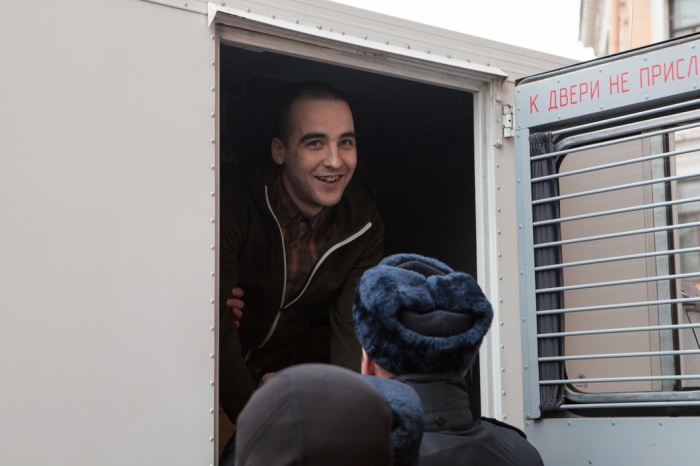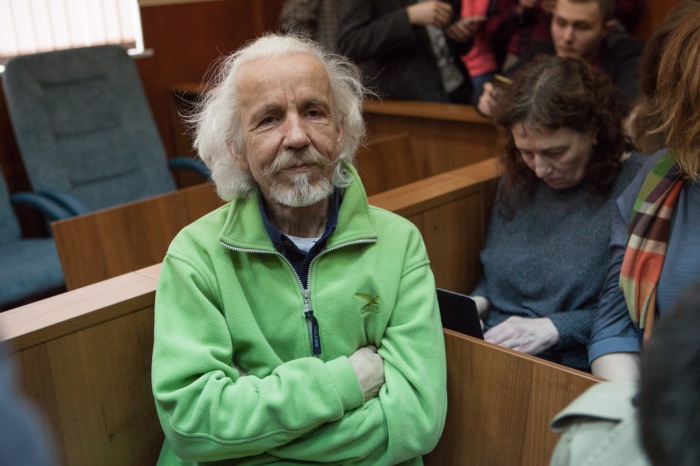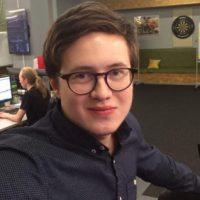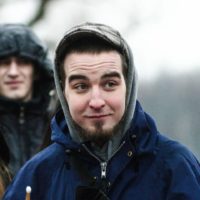If you have found a spelling error, please, notify us by selecting that text and pressing Ctrl+Enter.
Jordan and Maidan: The Network Trial, Day Three
Sergei Kagermazov
OVD Info
April 11, 2019

Yuli Boyarshinov in court. Photo by David Frenkel. Courtesy of OVD Info
The left-wing radical community Network existed, but its young anarchists were training to fend off attacks by ultra-rightists when and if a coup like the one that took place in Ukraine kicked off in Russia. In any case, this was the takeaway message of the testimony given by defendant Yuli Boyarshinov. Echo of Moscow in Petersburg correspondent Sergei Kagermazov describes day three of the Network trial for OVD Info.
The Guerrilla School
The courtroom at the 224th Garrison Military Court in Petersburg is
unable to accommodate everyone. Some members of the public are left
standing on the far side of the metal detector. The bailiffs claim there
is no room and do not let people into the hallway even.
Later, it transpires that several university students who had not heard of the case wormed their way into the courtroom. Someone asked them to attend the hearing, and so reporters from Novaya Gazeta, TASS, and Rosbalt are unable to get into the courtroom. Subsequently, one of the students was identified as a member of the local branch of United Russia’s Young Guard (Molodaya gvardiya). Fontanka.ru would write that the FSB were behind the restricted access to the courtroom.
The highlight of day three of the trial is defendant Yuli Boyarshinov’s testimony. He pleaded guilty and moved to have his case tried separately under a special procedure involving elimination of the evidence phase, but the court denied his motion.
According to Boyarshinov, he knew he was an antifascist approximately since 2009. Six years later, he met another person accused [and convicted] in the case, Igor Shishkin. Shiskin also pleaded guilty, made a deal with case investigators, and was sentenced to three and a half years in prison.
“Around 2015 or 2016, I came to think a violent coup was possible in Russia. On the internet, I learned about radical right-wing groups planing something like what happened in Ukraine in 2014,” says Boyarshinov, who speaks as if he were reading the case file aloud.
People ordinarily do no talk like this.
Boyarshinov insists he was interested only in self-defense in the event radical nationalists emerged in Russia. He learned to handle weapons at the Guerrilla Club, a place in Petersburg affiliated with the DOSAAF [Voluntary Society for Assisting the Army, Air Force and Navy]. Other suspects in the Network case, whom Boyarshinov identified as Yegor and Polina, also took instruction there. Boyarshinov cannot recall their surnames. The young people purchased mock-ups of Kalashnikov rifles and practiced with them. However, their only goal was self-defense. Boyarshinov emphasizes the young people were not planning any attacks.
It was also then the suspect [sic] met Alexandra Aksyonova, who introduced herself as Olya. Aksyonova is the wife of another defendant in the case, Viktor Filinkov, who is being tried together with Boyarshinov. The young woman is currently in Finland, where her application for political asylum is under review. NTV has reported Aksyonova was one of the leaders of the Network and alleged she had ties with Ukrainian nationalists.
As for the Guerrilla Club, it was also a place where future Donetsk People’s Republic and Lugansk People’s Republic volunteer fighters trained, as well as the Swedes responsible for the bomb attacks in Gothenburg in 2016 and 2017. But none of these people had yet piqued the FSB’s curiosity. When Filinkov asks whether Boyarshinov knew numerous nationalists trained at the Guerrilla Club, Judge Roman Muranov disallows the question as having no bearing on the case.
Jordan 1
Boyarshinov also testifies that, in the early summer of 2016, he was
invited to a meeting in the Priozersk District of Leningrad Region. The
meeting was attended by Yegor, Polina, and Shishkin, as well as Anton
and Pasha, Network members from Penza (the men’s real names were Maxim
Ivankin and Dmitry Pchelintsev, who are two more defendants in the
case), and two other people. Since the Petersburgers did not know the
people from Penza, they also used pseudonyms. Boyarshinov introduced
himself as Yura, Yegor as Matvei, and Shishkin as Maxim.
At the meeting, the young men from Penza showed the others a document they called “The Code.” It was a draft project for a community called the Network. Boyarshinov says “The Code”{ ran to around fifteen pages, but only a couple of pages were read aloud to him. The case file contains a document resembling “The Code,” but that is the problem: it only resembles it. Boyarshinov was able to read the entire text of “The Code” only during the pretrial investigation. The young men from Penza said [at the meeting in the Priozersk District] they wanted to encourage the cooperation of different groups involved in self-defense.

Yuli Boyarshinov in court. Photo by David Frenkel. Courtesy of OVD Info
“So, formally, I joined the Network community,” Boyarshinov admits.
Due to security considerations, it was decided to identify the Petersburg group as “Jordan 1.”
Subsequently, members of the Network would choose different specialties for themselves. Since he had studied demolition and explosives at the Guerrilla Club, Boyarshinov became the group’s sapper.
Another meeting was held in western or northwestern Moscow Region in the woods. Six people attended, including members from Moscow. A third meeting took place in the winter of 2016 at Shishkin’s mother’s dacha. There were also several meetings in the autumn of 2016.
It was at one of these meetings that Boyarshinov met Filinkov. After Boyarshinov has testified, the people in the courtroom learn that, according to the case file, the FSB was already staking out both defendants at the time.
In February 2017, another meeting was held in a rented flat in Petersburg. Shishkin did not come to the meeting, but Filinkov, the Muscovites, and Pchelintsev and Ivankin were present. It was at this meeting that what the FSB identifies as “the minutes” was left behind, finding its way into the case file.
“I cannot corroborate what is described in the minutes of the meeting: I did not take notes. But the description seems more or less accurate,” says Boyarshinov.
When he read the minutes of the meeting, he realized the Network had decided not just to learn self-defense, but to try and destroy the regime.
“I don’t believe in violence, in violence against state authorities. I am sorry I was in such a community,” Boyarshinov repents.
Boyarshinov was detained by police. He claims to have found the smoke powder [with which police apprehended him] on the the roof of a building, since he worked as an industrial climber. He found the powder interesting, since he was studying demolition and explosives. When it was reported Pchelintsev had been detained, Boyarshinov decided to throw the powder away. He left his house and was caught by police.
“Russia’s Falling Apart, We Have to Leave”
The next to testify is Stepan Prokofiev, in whose flat Filinkov lived
while he was looking for a place to rent. Prokofiev’s flat was searched
by the FSB after they detained Filinkov.
The defendant [Filinkov] immediately points out Prokofiev might commit perjury and slander him.
“The FSB coerced the witness,” argues Filinkov.
[On the day of the search at his flat], Prokofiev was awoken, forced to lie face down on the floor, and handcuffed. He would spend the night at a police station. When Filinkov’s defense attorney, Vitaly Cherkasov, asks whether police explained to him why spent the night at a police station, Judge Muranov disallows the question as having no bearing on the case.
At the
courthouse: members of the public holding pieces of paper inscribed
with the message “NTV lies.” Photo by David Frenkel. Courtesy of OVD Info
“Filinkov went to Ukraine to see his wife. When he got back, he told me he had met someone who had fought in Donbas while he was in Kyiv. Filinkov told me a couple of times that Russia was falling apart and we had to leave. He said it would happen after the [March 2018 Russian] presidential election. He would talk about leaving for Georgia or Ukraine after this happened, because it was cheaper to live there,” Prokofiev recounts.
Filinkov counters that he never mentioned talking with anyone who fought in Donbas.
Prosecutor Yekaterina Kachurina is more interested in two guns that were legally registered in Filinkov’s wife’s name. However, it follows from the testimonies of Filinkov and the witness that, for the time being, there is nothing for the prosecution to get its hooks into. The papers for the guns were in order, and the guns were kept in a safe.
The day ends with an attack by an NTV crew on the attorneys and parents of the defendants. However, members of the pubic cover the lens of NTV’s camera with pieces of paer inscribed with the message “NTV lies” and rattle the young woman holding the microphone by peppering her with absurd questions. Meanwhile, the defense attorneys are able to escape, while the parents get into taxis and quickly quite the scene.
_____________________________________________________________________
Vitaly Cherkasov
Facebook
April 10, 2019
Today, defendant Yuli Boyarshinov, while generally admitting his guilt, did not corroborate the prosecution’s position.
The prosecution has insisted that the members of the Network terrorist community, via “direct involvement in training sessions” that took place in St. Petersburg, Leningrad Region, and Penza Region, mastered “tactical methods of seizing buildings, facilities, and individuals” in order to “forcibly capture and eliminate” state authorities and “change the constitutional order.”
When examined in court, Boyarshinov corroborated the testimony he had given during the pretrial investigation: the goal of the training sessions was to master the skills of self-defense against ultra-nationalists. Defense, not offense!
[…]
_____________________________________________________________________
He Admitted His Guilt But Did
Nothing Wrong: Yuli Boyarshinov’s Testimony at Network Trial Gives
Prosecution’s Case No Trump Cards
Тatyana Likhanova
Novaya Gazeta in Petersburg
April 11, 2019
The authorities decided to restrict access to the trial of the so-called terrorist community Network, which is an organization now officially banned in Russia.
The high-profile case is being heard by a circuit panel of judges from the Moscow District Military Court at the Garrison Military Court in Petersburg. The hearings have been held in a cramped courtroom with two rows of benches accommodating ten people each. It is thus out of wildly out proportion with the heightened attention paid to the case by the public and the media.
On Tuesday, journalists from several periodicals appealed to the Moscow District Military Court to provide them with normal working conditions. On Wednesday morning, the approaches to the courtroom were occupied by groups of students from the Chemical and Pharmaceutical University and Herzen University’s law school.
The former said they had been sent there by a university official responsible for military training and patriotic education, while the latter claimed they had come to witness a high-profile case they had long been following, although they could not answer a single question about what was at stake in the case.
Among those crowded around the door to the courtroom was a young man bearing a resemblance to Vlad Girmanov, secretary of the military and patriotic club at the Pharmaceutical University, as well as people who had picketed the Petersburg office of [Russian opposition politician and anti-corruption crusader] Alexei Navalny.

Yuli Boyarshinov arriving at the courthouse. Photo by Elena Lukyanova. Courtesy of Novaya in Petersburg
The influx of “extras” was an excuse to limit the access of the press and the public to the trial. The bailiffs refused to let correspondents from Deutsche Welle, TASS, Fontanka.ru. Bumaga, Rosbalt, and other media outlets into the courthouse to cover the trial, as well as Petersburg Public Monitoring Commission member Yekaterina Kosarevskaya. Complaints were filed with the head of the St. Petersburg bailiff service and the chairs of the Petersburg Garrison Military Court and the Moscow District Military Court. They were asked to verify the legality of the actions taken by the bailiffs and secure a courtroom large enough to accommodate everyone interested in witnessing this high-profile case. According to Fontanka.ru, the order to restrict access to the courtroom was made by FSB officers, who thus bypassed the top officials in the Petersburg judicial system.
The hearing opened with testimony by Yuli Boyarshinov, who has pleaded guilty. He said he had been an antifascist since 2009. In the winter of 2015–2016, he concluded that riots involving violence by nationalist groups (“along the lines of the events in Ukraine in 2014”) were possible in Russia. In order to acquire self-defense skills, Boyarshinov attended a month-long course at the Guerrilla Tactical and Firearms Training Center. (Its website says it is affiliated with the DOSAAF [Voluntary Society for Assisting the Army, Air Force and Navy] and “teaches civilians survival skills in local armed conflicts, social unrest, and martial law.”) The course included instruction in handling firearms, surviving in the woods, first aid, radio communication, and mines and explosives.
Boyarshinov attended the classes with his friend Yegor and a young woman identified as Polina. In addition to lectures, training sessions were held at a shooting range near the village of Olgino, during which Boyarshinov used a mock-up of a Kalashnikov assault rifle he acquired. Alexandra Askyonova, co-defendant Viktor Filinkov’s future wife, also went to the shooting range.
In the summer of 2016, Boyarshinov was invited to a meeting with “guys from Penza who were also interested in self-defense.” The meeting took place in the woods of Leningrad Region.
“We made bonfires, discussed different social problems and issues of self-defense, and trained with dummy weapons,” he said.
The attendees used fictitious names because they did not yet trust each other. One of the four attendees would later be identified as Dmitry Pchelintsev, another as Maxim Ivankin.
According to Boyarshinov, the Penza attendees talked about a project provisionally entitled the Network, designed to unite different groups for self-defense classes.
They presented their vision of the organization in a manifest of sorts, entitled “The Network Code,” one or two pages of which were read aloud.
Boyarshinov claimed he did not take what he heard seriously, and when someone later sent him the entire text of “The Code,” he did not bother to read it from cover to cover. He read the full text, nearly twenty pages, only when he was recently reviewing the criminal investigation case file. He was unable to corroborate whether what he read was identical to what had been sent to him earlier, but he said it seemed similar.
The document also outlines possible areas for studying self-defense skills: tactician, medic, signalman, and other roles, with no reference to specific people.
“These areas correspond to the disciplines I studied during the course at the Guerrilla Center,” Boyarshinov noted.

Yuli Boyarshinov’s father Nikolai in the courtroom. Photo by Elena Lukyanova. Courtesy of Novaya Gazeta in Petersburg
The second meeting that summer took place in the Moscow Region. Several young people from the capital joined the attendees of the first meeting. Boyarshinov remembered only that one of them was named Lev. There were more conversations around campfires and training sessions with dummy weapons.
In the winter of 2016–2017, the group traveled to Igor Shishkin’s mother’s dacha, spending their time in much the same way.
Boyarshinov stressed they worked only on fending off attacks during all the meetings and training sessions: they never practiced raids and assaults. Political issues were not discussed, and there was no talk of drilling for terrorist-like crimes.
Shishkin, who made a deal with case investigators, also noted the absence of violent actions during the training when he described the trip to his mother’s dacha in his testimony.
Boyarshinov corroborated that Filinkov did not attend the first two meetings. Aksyonova introduced Boyarshinov to Filinkov in the autumn of 2016. Filinkov took part in a couple of training sessions at the firing range near Olgino. One dealt with first aid and evacuating the wounded, while the second focused on fending off attacks of VIPs [sic] by employing the methods of private security companies. No knives or firearms were used during the training sessions, only dummy machine guns.
As for the group’s allegedly strict conspiratorial methods, among which case investigators identified the use of messengers and encrypted correspondence, Boyarshinov explained they had been his usual means of communication in the years prior to his involvement with the group.
The third meeting with the young men from Penza and several Muscovites took place in a rented flat in Petersburg in February and March 2017. In the case file, this meeting has been identified as a “national congress of the Network terrorist community.”
Boyarshinov, on the contrary, described a two- or three-day meeting, involving approximately a dozen people. They discussed a little of everything, from music to social, environmental and antifascist events. Filinkov was in attendance, but Boyarshinov could not remember him giving a report, showing any initiative or shouldering any responsibilities for further action.
Boyarshinov could not say who organized the meeting and who kept the minutes of the meeting. (A printed file entitled “Minutes of the Congress” was entered into physical evidence.) He could not corroborate whether Filinkov was present the entire time or whether he came and went, since he had himself had come to and gone from the meeting. As far as he could remember, “The Network Code” was also discussed.
However, some of those present said the group should prepare vigorously to fend off potential violent actions when circumstances in Russia deteriorated, while others had advocated “provoking actions themselves,” Boyarshinov recalled uncertainly.
Only after carefully reading the redaction of “The Network Code” provided to him by case investigators did Boyarshinov discover “it had been proposed to establish combat cells and target the authorities.”
“I have never espoused terrorism and I am sorry I wound up in this community,” he added.
However, Boyarshinov was unable to clarify who he believed had authored the document, how its contents were regarded by any of his current co-defendants, and whether it had been backed by someone specifically.
UPDATE
The next day, April 11, the hearing started nearly two hours late.
(Allegedly, the armed escort bringing the defendants to court had got
stuck in traffic, although it takes fifteen minutes to drive from the
remand prison to the courthouse.)
The hearing was brief. The court heard the testimony of the two janitors who had served as official witnesses during the search of Filinkov’s place of residence. The presiding judge then announced the trial was adjourned until May 14.
One explanation for such a long adjournment is the reluctance of Petersburg investigators to wind the case up before the scandal surrounding the lead investigator in the main part of the Network case, Valery Tokarev, a senior investigator in the FSB’s Penza Region office, has been cleared up.
The previous day’s evening news broadcast on state TV channel Russia 24 featured a segment on fugitive businessman Alexei Shmatko.
Shmatko, who complained he was tortured by Tokarev, has been granted political asylum in Great Britain. (The segment starts at the fifty-minute mark.)
This was not the first time the All-Russia State Television and Radio Broadcasting Company had discussed the vicissitudes of this Penza businessman’s career. Shmatko had been on federal business ombudsman Boris Titov’s list of fugitive Russian businessmen who had voiced a desire to return home. But Tokarev’s name had never been mentioned on the air before. (Although Shmatko claims he had mentioned it during previous TV interviews.)
This time round, the presenter on state television was insistent, encouraging the businessman to dot his i’s and cross his t’s. Who had bribed him? What was the reason?
“He subjected me to torture,” Shmatko said, specifying his charges against Tokarev, “and accepted a bribe from me to release me from remand prison.”
Shmatko complained he had informed the Russian Investigative Committee about this incident in a written statement, but they “had not batted an eye.” He also assured the news presenter he was willing to return to Russia if his case were transferred to the feds, investigated thoroughly, and Senior Investigator Tokarev were arrested.
If this happened, Shmatko would return to Russia for Tokarev’s trial and testify against him.
The interview with Shmatko was chockablock with quotations from the President’s Address to the Federal Assembly on the need to criminalize illegal investigations and punish those responsible for launching them.
On April 10, Prosecutor General Yuri Chaika, speaking in the Federation Council, reported the number of corrupt FSB officers who had been outed had more than doubled. He also drew attention to “egregious cases of cruelty toward inmates.”
Three defendants in the Network case in Penza—Dmitry Pchelintsev, Ilya Shakursky, and Arman Sagynbayev—complained they had been tortured with electric shocks in an attempt to force them to incriminate themselves and others, including the Petersburg defendants.
Translated by the Russian Reader. You can find links to my previous coverage of the Network case here.

